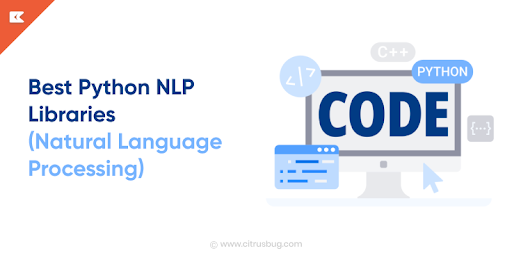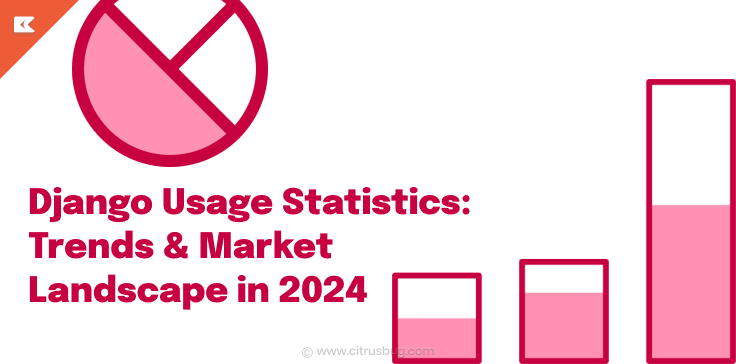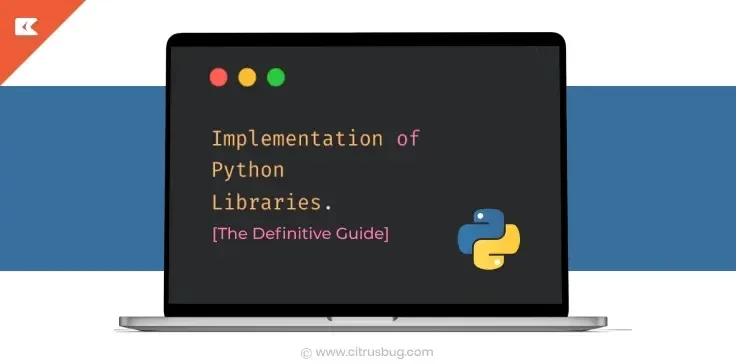Best Python NLP Libraries for Advanced Language Processing
- August 8, 2024
-
3432 Views
- by Ishan Vyas

Natural Language Processing (NLP) is one of the most important branches of Artificial Intelligence (AI). The goal is to teach machines to analyze, understand, and generate human language. Businesses use large amounts of unstructured and text-heavy data that needs to be processed efficiently. A large part of the data made on the web and put away in data sets is normal human language, and until recently, businesses couldn’t successfully analyze this data. This is where natural language processing is helpful. NLP plays a growing role in enterprise solutions that help smooth out and automate business tasks, increment employee efficiency and work on strategic business processes.
Also, The rise of AI chatbots, virtual assistants, and other voice-based applications has caused an explosion in the demand for NLP developers. Developers can access ready-made tools that improve on text preprocessing, permitting them to focus more on building robust machine-learning models.
These python libraries are designed to handle and solve various problems related to NLP. In due time, many more of these libraries were developed, especially in the Python ecosystem, to help a developer in effectively and quickly producing high-quality projects.
Why Python for Natural Language Processing (NLP)?
Python is the ideal programming language for an NLP project due to its many advantages. For instance, it has a simple syntax and clear semantics.
However, there is another feature of this adaptable language that makes it an ideal technology for assisting machines in processing natural languages. Numerous NLP-related tasks, such as document classification, topic modeling, part-of-speech (POS) tagging, word vectors, and sentiment analysis, are made possible by the extensive collection of NLP tools and libraries it offers developers.
Top Python NLP Libraries in 2024
Lets see the top Python libraries for NLP that you should use in 2024.
Natural Language Toolkit
One of the most used libraries within NLP is called Natural Language Toolkit, NLTK. This is an open-source library that offers a lot of tools, including tokenization, stemming and lemmatization, among others. NLTK is used in the processing of text data on domains like sentiment analysis, topic modeling, and machine translation.
The library has all of the major fundamental features needed to do nearly every sort of Python natural language handling activity. It helps computers read and process words, sentences, and comprehend what they mean. It understands words and assists computers with figuring out stories and messages.
NLTK functionalities:
- Tokenization, POS, NER, classification, sentiment analysis, access to corpora
Pros:
- Most well-know and full NLP library with many 3rd extensions
- Supports the largest number of languages compared to other libraries
Cons:
- Difficult to learn and use
- Slow
- Only splits text by sentences, without analyzing the semantic structure
TextBlob
TextBlob is the ideal entry-level NLP library, despite the fact that it may not be the most robust tool available and may not be sufficient for larger projects.
With an incredibly friendly UI, TextBlob assists developers with getting to know the world of NLP applications. Assuming you’re searching for the best place to learn what noun phrase extraction or sentiment analysis even are, TextBlob is for you.
TextBlob Functionalities:
- Tokenization, POS, NER, classification, sentiment analysis, spellcheck, parsing
Pros:
- Simplicity
- Integration with NLTK and pattern
- Ease of learning
- Provides language translation and detection which is powered by google translate
Cons:
- Limited Complexity
- No neural network models
CoreNLP
This NLP library is developed by the Stanford Natural Language Processing Group. The most significant advantage of CoreNLP is its high-speed and works well in product development environments. It’s eminent for its robustness and supports different tasks, including named entity recognition and coreference goal.
CoreNLP Functionalities:
Tokenization, Part-of-Speech Tagging, Named Entity Recognition (NER), Sentiment Analysis, Dependency Parsing
Pros:
- Wide Range of NLP Tasks
- Integrated Pipeline
- Multilingual Support
- Pre-trained Models
- Active Development
Cons:
- Resource Intensive
- Dependency on Java
- Limited Customization
spaCy
SpaCy is a cutting edge NLP library that gives quick and productive tokenization and parsing devices. It supports over 50 languages and gives pre-prepared models named entity recognition, dependency parsing, and more. SpaCy is known for its speed and precision, making it a popular choice for handling large datasets.
spaCy Functionalities:
Tokenization, POS, NER, classification, sentiment analysis, dependency parsing, word vectors
Pros:
- Efficiency
- Pre-trained Models
- User-Friendly
- Support for Multiple Languages
Cons:
- Customization Limitations
- Resource Intensive
Polyglot
Polyglot is a flexible, multilingual Python package developed for NLP tasks. It includes support and tools for a wide set of NLP tasks, from basic ones like tokenization and named entity recognition to part-of-speech tagging. Multilingual functionality is available in this library, making it useful in case of high linguistic diversity projects.
Polyglot Functionalities:
- Tokenization, named Entity Recognition (NER), Part-of-Speech Tagging, Sentiment Analysis, Language Detection
Pros:
- Multilingual Support
- Generalized tools for NLP tasks
- Easy to integrate
Cons:
- Limited Documentation
- Performance Variability
- Less Community Resources
Gensim
Gensim is a Python library that recognizes semantic comparability between two documents through vector space modeling and point modeling toolkit. It can deal with large text corpora with the assistance of efficient data streaming and incremental algorithms, which is more than can be said about different packages that only target batch and in-memory processing.
Although it is not a complete NLP toolkit like NLTK or spaCy, it supports a variety of other NLP tasks and was initially developed for topic modeling. Its primary use case is working with word vectors.
Gensim Functionalities:
Text preprocessing, Document Representation, Word Embedding, Topic Modeling, Document Similarity and Retrieval
Pros:
- Efficiency and Scalability
- Topic Modeling
- Word Embeddings
Cons:
- Sparse Documentation
- Limited Deep Learning Support
Pattern
Pattern is a Python library for machine learning and NLP. IIt is used for various NLP tasks, from tokenization to part-of-speech tagging, named entity recognition, and sentiment analysis, among other things. Pattern is a library for machine learning, text processing, natural language processing, web mining, and network analysis.
Pattern Functionalities:
- tokenization, POS, NER, sentiment analysis, parsing
Pros:
- Ease of Use
- Integration with Other Libraries
- Multilingual Support
- Network analysis and visualization
Cons:
- Not optimized for some specific NLP tasks
- Limited Documentation
- Slow Development Activity
Hugging Face
Hugging Face is one of the top Python libraries in natural language processing, which provides a wide array of pre-trained models and tools to work on tasks such as text classification, sentiment analysis, and generation. With a user-friendly interface and highly effective potential, Hugging Face has made its mark as one of the top resources for all developers and researchers in NLP.
Hugging Face Functionalities:
- Transformers Library, Tokenization, Pipeline API, Training and Fine-Tuning, Datasets Library
Pros:
- Wide Range of Pre-Trained Models
- Robust community support and regular updates with new features and improvements.
- Easily integrates with popular frameworks like PyTorch and TensorFlow.
Cons:
- Resource Intensive:
- The wide array of options and configurations may be overwhelming for newcomers.
- Pre-trained models can be large, impacting download times and storage.
Take Advantage of Python for NLP
One of the premier choices to perform natural language processing is Python, principally because of its ease, flexibility, and large ecosystem. You can easily leverage a large number of pre-trained models using Python and fine-tune them according to your needs, hence accelerating development and reducing the need for extensive machine learning expertise. Its easy syntax, along with very robust community support, makes Python the ideal language for both beginners and experts alike when you need to prototype quickly and iterate upon.
Besides, Python integrates smoothly with other technologies and frameworks like TensorFlow and PyTorch to extend its capabilities toward difficult NLP tasks. From chatbots and sentiment analysis systems to language translation systems, the wide array of applications is supported by the rich diversity of libraries and tools within Python.
By using Python for NLP, it is possible to apply the very latest developments in language processing technology to create robust solutions that bring more insights from textual data. This is a balance of usability with advanced functionalities that makes Python very useful in any NLP project.
Final Thoughts
In conclusion, the best Python NLP libraries can significantly enhance your ability to handle and analyze natural language data. Libraries such as SpaCy, NLTK, Gensim, Pattern and Hugging Face Transformers offer robust tools for tasks ranging from text classification and sentiment analysis to sophisticated language generation. The right library will smooth your workflow in a manner that ensures results are more accurate and insightful. However, special knowledge and experience are usually required in order to integrate these libraries effectively into your projects.
This makes it important to partner with a professional Python and NLP development company to tap their potentials to the fullest for ensuring your project’s success. Experts can help you achieve tailored solutions with strategic guidance by going through complexities in NLP.





 SaaS Development
SaaS Development Web Application Development
Web Application Development Mobile Application Development
Mobile Application Development Custom Software Development
Custom Software Development Cloud Development
Cloud Development DevOps Development
DevOps Development MVP Development
MVP Development Digital Product Development
Digital Product Development Hire Chatbot Developers
Hire Chatbot Developers Hire Python Developers
Hire Python Developers Hire Django Developers
Hire Django Developers Hire ReactJS Developers
Hire ReactJS Developers Hire AngularJS Developers
Hire AngularJS Developers Hire VueJS Developers
Hire VueJS Developers Hire Full Stack Developers
Hire Full Stack Developers Hire Back End Developers
Hire Back End Developers Hire Front End Developers
Hire Front End Developers AI Healthcare Software Development & Consulting
AI Healthcare Software Development & Consulting Healthcare App Development
Healthcare App Development EHR Software Development
EHR Software Development Healthcare AI Chatbot Development
Healthcare AI Chatbot Development Telemedicine App Development Company
Telemedicine App Development Company Medical Billing Software Development
Medical Billing Software Development Fitness App Development
Fitness App Development RPM Software Development
RPM Software Development Medicine Delivery App Development
Medicine Delivery App Development Medical Device Software Development
Medical Device Software Development Patient Engagement Software Solutions
Patient Engagement Software Solutions Mental Health App Development
Mental Health App Development Healthcare IT Consulting
Healthcare IT Consulting Healthcare CRM Software Development
Healthcare CRM Software Development Healthcare IT Managed Services
Healthcare IT Managed Services Healthcare Software Testing services
Healthcare Software Testing services Medical Practice Management Software
Medical Practice Management Software Outsourcing Healthcare IT Services
Outsourcing Healthcare IT Services IoT Solutions for Healthcare
IoT Solutions for Healthcare Medical Image Analysis Software Development Services
Medical Image Analysis Software Development Services Lending Software Development Services
Lending Software Development Services Payment Gateway Software Development
Payment Gateway Software Development Accounting Software Development
Accounting Software Development AI-Driven Banking App Development
AI-Driven Banking App Development Insurance Software Development
Insurance Software Development Finance Software Development
Finance Software Development Loan Management Software Development
Loan Management Software Development Decentralized Finance Development Services
Decentralized Finance Development Services eWallet App Development
eWallet App Development Payment App Development
Payment App Development Money Transfer App Development
Money Transfer App Development Mortgage Software Development
Mortgage Software Development Insurance Fraud Detection Software Development
Insurance Fraud Detection Software Development Wealth Management Software Development
Wealth Management Software Development Cryptocurrency Exchange Platform Development
Cryptocurrency Exchange Platform Development Neobank App Development
Neobank App Development Stock Trading App Development
Stock Trading App Development AML software Development
AML software Development Web3 Wallet Development
Web3 Wallet Development Robo-Advisor App Development
Robo-Advisor App Development Supply Chain Management Software Development
Supply Chain Management Software Development Fleet Management Software Development
Fleet Management Software Development Warehouse Management Software Development
Warehouse Management Software Development LMS Development
LMS Development Education App Development
Education App Development Inventory Management Software Development
Inventory Management Software Development Property Management Software Development
Property Management Software Development Real Estate CRM Software Development
Real Estate CRM Software Development Real Estate Document Management Software
Real Estate Document Management Software Construction App Development
Construction App Development Construction ERP Software Development
Construction ERP Software Development






![How to Build an Image-to-Text Converter Using Python? [A Simple Guide for Developers] How to Build an Image-to-Text Converter Using Python? [A Simple Guide for Developers]](https://citrusbug.com/wp-content/uploads/How-to-Build-an-Image-to-Text-Converter-Using-Python_-A-Simple-Guide-for-Developers-1.png)

